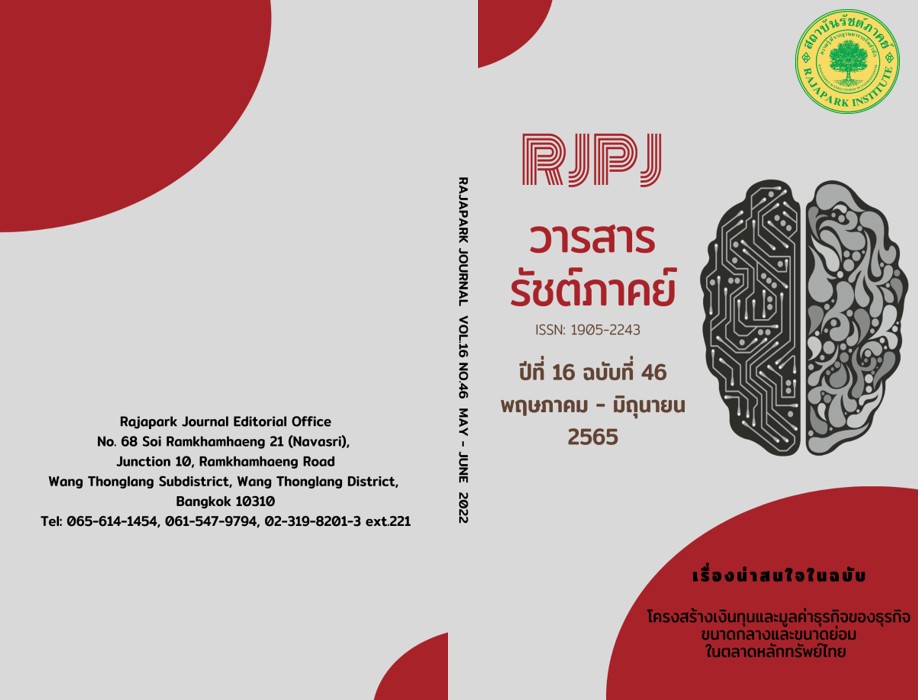การบริหารจัดการความเป็นสากลเพื่อการดำเนินชีวิตในประชาคมอาเซียน
Main Article Content
บทคัดย่อ
การศึกษานี้มีวัตถุประสงค์เพื่อ (1) ศึกษาปัญหาการบริหารจัดการ (2) ศึกษาแนวทางการพัฒนาการบริหารจัดการ และ (3) เสนอตัวแบบแนวทางการพัฒนาการบริหารจัดการความเป็นสากลเพื่อการดำเนินชีวิตในประชาคมอาเซียน โดยใช้แนวคิดความเป็นสากลเพื่อการดำเนินชีวิตในประชาคมอาเซียน 3 ด้านเป็นกรอบแนวคิดการวิจัย การศึกษานี้ใช้รูปแบบการวิจัยเชิงคุณภาพ โดยใช้การวิจัยเอกสารและการสัมภาษณ์เชิงลึกเพื่อเก็บรวบรวมข้อมูล จากนั้นประมวลแปลความ วิเคราะห์ และนำเสนอข้อมูลด้วยการพรรณนาพร้อมภาพและตาราง ผลการศึกษาพบว่า 1. ปัญหาการบริหารจัดการที่สำคัญ คือ หน่วยงานของรัฐบริหารจัดการส่งเสริมความเป็นสากลเพื่อการดำเนินชีวิตในประชาคมอาเซียนโดยให้ความสำคัญกับการเปิดตนเองต่อโลกกว้างไม่มากเท่าที่ควร รวมทั้งขาดตัวแบบแนวทางการพัฒนาการบริหารจัดการความเป็นสากลเพื่อการดำเนินชีวิตในประชาคมอาเซียน 2. แนวทางการพัฒนาการบริหารจัดการที่สำคัญ คือ หน่วยงานของรัฐควรบริหารจัดการส่งเสริมความเป็นสากลเพื่อการดำเนินชีวิตในประชาคมอาเซียนโดยให้ความสำคัญกับการเปิดตนเองต่อโลกกว้างเพิ่มมากขึ้น 3. ตัวแบบแนวทางการพัฒนาการบริหารจัดการความเป็นสากลเพื่อการดำเนินชีวิตในประชาคมอาเซียนตามแนวคิดความเป็นสากลเพื่อการดำเนินชีวิตในประชาคมอาเซียน ควรประกอบด้วย 3 ด้านตามลำดับความสำคัญ ดังนี้ (1) การเปิดตนเองต่อโลกกว้าง (2) การเป็นส่วนหนึ่งของโลกกว้าง และ (3) การยอมรับความหลากหลาย
Article Details

อนุญาตภายใต้เงื่อนไข Creative Commons Attribution-NonCommercial-NoDerivatives 4.0 International License.
ทัศนะและความคิดเห็นที่ปรากฏในวารสาร ถือเป็นความรับผิดชอบของผู้เขียนบทความนั้น และไม่ถือเป็นทัศนะและความรับผิดชอบของกองบรรณาธิการ
เอกสารอ้างอิง
Asian Development Bank Institute. (2014). ASEAN 2030: Toward a Borderless Economic Community. Asian Development Bank Institute.
Association of Southeast Asian Nations. (2003). Declaration of ASEAN Concord II (Bali Concord II). https://asean.org/speechandstatement/declaration-of-asean-concord-ii-bali-concord-ii/
Association of Southeast Asian Nations. (2020). The ASEAN Charter (28th ed). ASEAN Secretariat.
Association of Southeast Asian Nations. (2021). The ASEAN Declaration. https://asean.org/the-asean-declaration-bangkok-declaration-bangkok-8-august-1967/
Brocki, J.J.M., & Wearden, A.J. (2006). A Critical Evaluation of the Use of Interpretative Phenomenological Analysis (IPA) in Health Psychology. Psychology and Health, 21(1), 87-108.
Chawanametha, P. (2017). To Be Thai in Internationlized World. Mahidol Library KM Blog. https://km.li.mahidol.ac.th/international-relations/
Chotiradapa, C. (2020). Leadership’s Roles in Rajabhat Universities on Internationalization. Phikun Journal, 18(1), 327-343.
De Wit, H., & Altbach, P.G. (2021). Internationalization in Higher Education: Global Trends and Recommendations for Its Future. Policy Reviews in Higher Education, 5(1), 28-46.
Denhardt, J.V., & Denhardt, R.B. (2003). The New Public Service: Serving, Not Steering. M.E. Sharpe.
Drysdale, P. (2017). ASEAN: The Experiment in Open Regionalism that Succeeded. In The ASEAN Economic Community Into 2025 and beyond. (pp. 64-86). Economic Research Institute for ASEAN and East Asia.
Elliott, R., & Timulak, L. (2005). Descriptive and Interpretive Approaches to Qualitative Research. In A Handbook of Research Methods for Clinical and Health Psychology. (pp. 147-152). Oxford University.
Francis, A. (1993). Facing the Future: The Internationalization of Post-Secondary Institutions in British Columbia, Task Force Report. British Columbia Centre for International Education.
Guest, G., Namey, E.E., & Michael, M.L. (2013). Collecting Qualitative Data: A Field Manual for Applied Research. SAGE.
Gulick, L., & Urwick, L. (2012). Notes on the Theory of Organization. In Classics of Organization Theory (7th ed.). (Pp. 86-95). Wadsworth.
Kankaew, J., & Suputtikun, T. (2014). Japan’s Role and Food Security in East Asia Region. Journal of Social Science, Faculty of Political Science, Chulalongkorn University, 44(2), 185-203.
Knight, J. (2004). Internationalization Remodeled: Definition, Approaches, and Rationales. Journal of Studies in International Education, 8(1), 5-31.
Knight, J. (2012). Five Truths about Internationalization. International Higher Education, 69(Fall), 4-5.
Koontz, H., & Weihrich, H. (2012). Essentials of Management: An International and Leadership Perspective (9th ed). McGraw-Hill.
Macmillan, T.T. (1971). The Delphi Technique. Paper presented at the Annual Meeting of the California Junior Colleges Associations Committee on Research and Development, Monterey, California, 3-5 May 1971. California Junior College Associations.
Ministerial Regulation on the Organization of Department of Cultural Promotion, Ministry of Culture B.E. 2557. (2014, 30 December). Royal Thai Government Gazette. Volume 131 Section 89 Kor. Pp. 40-44.
Ministerial Regulation on the Organization of the National Bureau of Agricultural Commodity and Food Standard, Ministry of Agriculture and Cooperatives B.E. 2557. (2014, 30 December). Royal Thai Government Gazette. Volume 131 Section 88 Kor. Pp. 11-16.
Nanarum, S. (2013). Ayutthaya and ASEAN: The Reflection of Relationship of Southeast Asia. ARU Research Journal Humanities and Social Science, 2(1), 75-84.
Osborne, D., & Gaebler, T. (1992). Reinventing Government: How the Entrepreneurial Spirit is Transforming the Public Sector. Addison-Wesley.
Putthasri, A. (2019). ASEAN Plus Three Emergency Rice Reserve: APTERR. Devawongse Varopakarn Institute of Foreign Affairs, Ministry of Foreign Affairs.
Robbins, S.P., Decenzo, D.A., & Coulter, M. (2013). Fundamentals of Management: Essential Concepts and Applications (8th ed). Pearson.
Sajjaphatanakul, A. (2017). The Concept of Thainess in Social Studies Subjects: Decentralization of Power in the Age of Postmodernity. Mekong-Salween Civilization Studies Journal, 8(2), 221-245.
Shimizu, K. (2010). ASEAN Economic Integration in the World Economy-Toward the ASEAN Economic Community (AEC). Economic Journal of Hokkaido University, 39, 77-88.
Simon, H. A. (2011). The Proverbs of Administration. In Classics of Organization Theory (7th ed). (pp. 164-180). Wadsworth.
Smith, J.A. (2011). Evaluating the Contribution of Interpretative Phenomenological Analysis. Health Psychology Review, 5(1), 9-27.
Srisawat, P. (2020). The Control of Marine Plastic Litters from Land Based Source under United Nations Convention on the Law of the Sea, 1982. Southeast Bangkok Journal, 6(2), 70-85.
Subboonrueng, H., & Bunyavejchewin, P. (2019). Thailand 4.0 in World Politics: The 5S Foreign Affairs Strategy. International Journal of East Asian Studies, 23(2), 312-327.
Tanomsridejchai, C. (2020). Development of State Officials’ Values Toward Public Service of Samut Prakan City Municipality. Rajapark Journal, 14(37), 1-14.
Tanomsridejchai, C. (2021). Teaching Manual on Internationalization for Living in the ASEAN Community and World Community. Valaya Alongkorn Rajabhat University under Royal Patronage.
The Act Amending Ministries, Sub-Ministry, and Departments, B.E. 2545 (No. 12) B.E. 2558. (2015, 22 January). Royal Thai Government Gazette. Volume 132 Section 4 Kor. p. 9.
The Royal Institute. (2013). The Royal Institute Dictionary B.E. 2011 (2nd ed.). The Royal Institute.
Thepchatree, P. (2019). Thai Foreign Relation: Revolution and Recommendations. In Contemporary Thai Foreign Relations: Multi-dimension of National Interests. (pp.82-105). Direk Jayanama Research Center, Faculty of Political Science, Thammasat University.
Wiruchnipawan, W. (2018). Digital Era Administration. Forepace.


